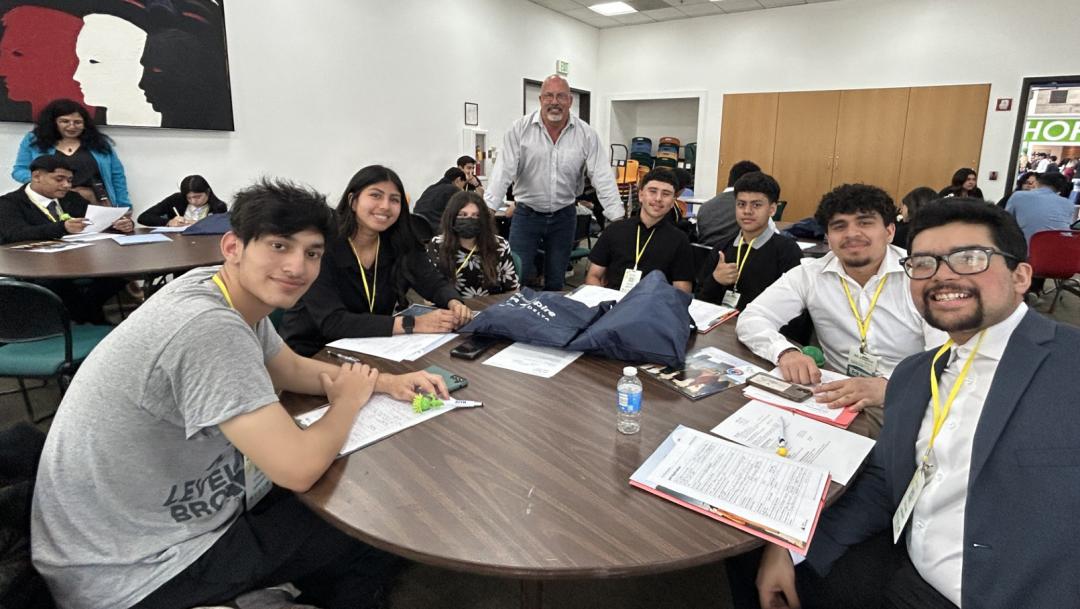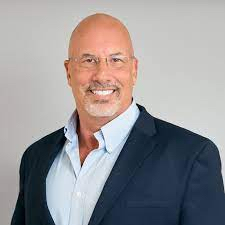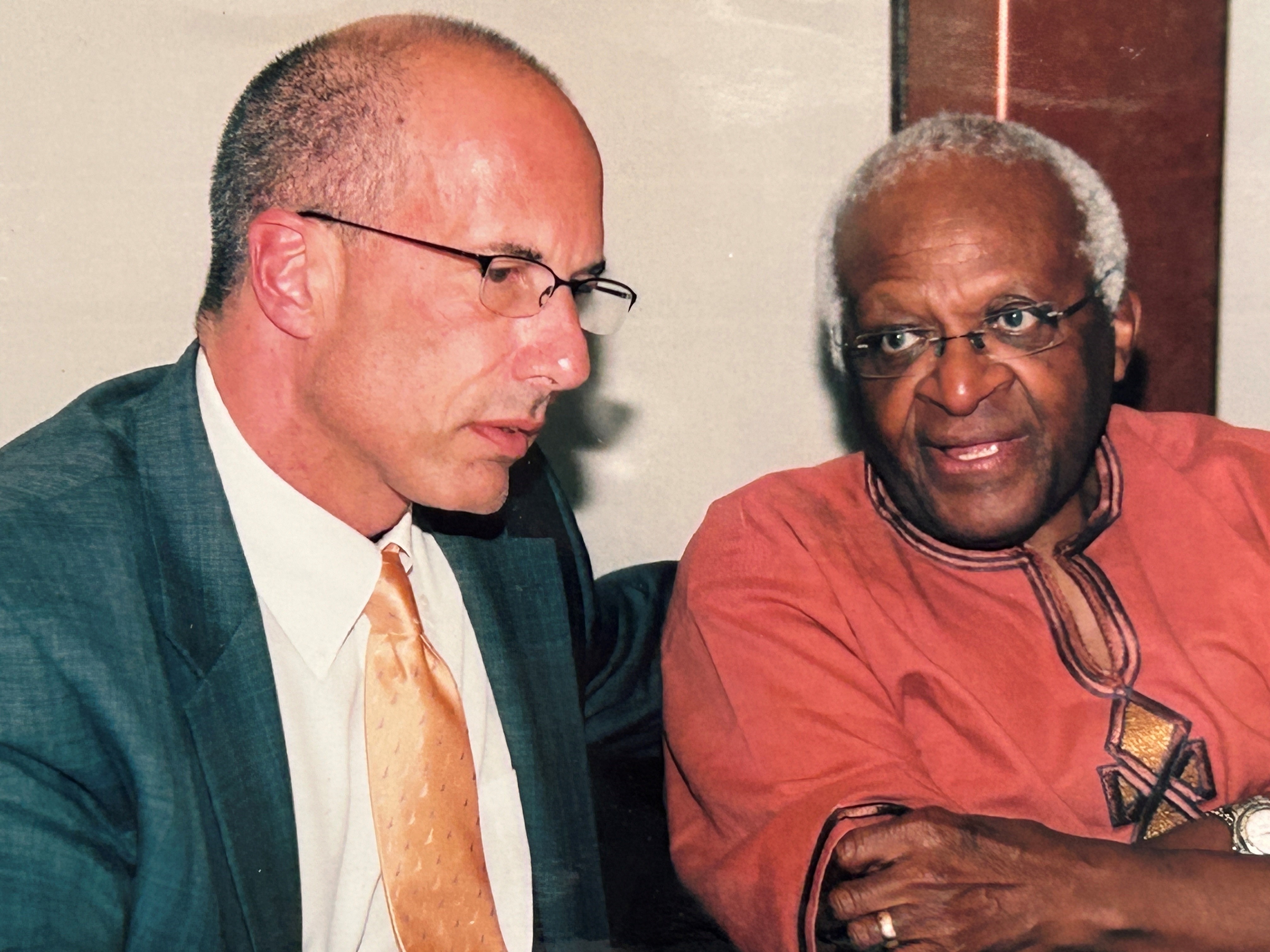
Les McCabe (standing, center), president and CEO of Junior Achievement of Southern California, helps students write resumes. Below photos: McCabe’s work with Semester at Sea allowed him to meet Archbishop Desmond Tutu in 1992 – and maintain a friendship with the Nobel Laureate until he passed away in 2021; and, also thanks to Semester at Sea, McCabe met Fidel Castro in Cuba in 1999.
Nothing junior about alumnus Les McCabe’s achievements
Life-changing experiences, including some that happened on the way to earning a bachelor’s degree in social ecology from UC Irvine in 1980, define Les McCabe, who is president and CEO of Junior Achievement of Southern California.
 Because the McCabe family’s limited financial resources dictated that he attend a University of California campus, and his older sister’s choice to attend UCLA convinced him to look beyond Westwood, he ultimately chose Irvine because it was “not too far, not to close” to his home in Claremont.
Because the McCabe family’s limited financial resources dictated that he attend a University of California campus, and his older sister’s choice to attend UCLA convinced him to look beyond Westwood, he ultimately chose Irvine because it was “not too far, not to close” to his home in Claremont.
“The appeal to Irvine was also its newness,” says McCabe, who arrived in 1976. “At the time, there was only one ring of university buildings surrounding campus park, the trees planted back then were tiny seedlings and as far as you could see around campus were open fields with cattle grazing. The fact that the campus was near Newport Beach was an added bonus, having spent some time there as a kid and having a love of the ocean.”
Before entering the residence halls, McCabe already made what would become lifelong friends through UCI’s orientation programs. “My UniPrep class of Jill Martin (now Halvaks), Dave Mayo, Terry Martinez, and Lori Miller (now Miller-Bath) … remain my closest friends to this day, who I communicate with throughout the week and get together with for a reunion at least once a year.”
His original intention was to major in pre-med biology, but “that was pretty short-lived as I wasn’t as adept as I needed to be in math and chemistry,” McCabe confides. “As I started to think about an alternative major, I knew I wanted to do something related to psychology and sociology, and human behavior. Social ecology was an obvious choice and felt cutting edge at the time because of its multi-discipline approach to education and the opportunity to explore subjects like criminal justice, the environment and human behavior, which was very appealing.”
 Where McCabe rested his head at night solidified that attraction. At the time, Sierra in Mesa Court was part of a longitudinal study that included a racially diverse cohort of students and a course based on psychologist and Harvard and University of Chicago Professor Lawrence Kohlberg’s theory of moral development.
Where McCabe rested his head at night solidified that attraction. At the time, Sierra in Mesa Court was part of a longitudinal study that included a racially diverse cohort of students and a course based on psychologist and Harvard and University of Chicago Professor Lawrence Kohlberg’s theory of moral development.
“I was very much influenced by individuals involved in the Sierra project who had close ties to the School of Social Ecology, including [faculty members] John Whitely, Janet Loxley, Art Lang, Jim Craig and Barbra Bertin,” McCabe recalls. “All these things combined made changing my major from biology to social ecology a natural fit for me. Additionally, there was something about being part of a new ‘discipline’ that took a broader approach to traditional subject areas that really appealed to me as well. Sort of like a college major pioneer at the time.”
Dorm life ruled during the 1976-’80 era, although an Italian restaurant called Don Vito’s across the street from UCI became an off-campus hangout, according to McCabe. Eventually, a Bob’s Big Boy opened farther down Campus Drive or there was always Charlie’s Chili’ in Newport Beach.
“The absence of a ‘college town’ like Westwood was and is to UCLA didn’t bother us at all,” McCabe says. “We created our own experiences on and off campus resulting in some of the greatest memories of our lives that we still talk about today. While we didn’t have a football team and all that comes with that at much larger schools, we did have Crawford Hall and the Anteater basketball team, which gave us the school athletic spirit at the time. Not to mention the national championship in water polo, swimming, and other sports that we could root for.”
A television program called “The Rock and Roll Sports Classic,” which was a spinoff of “The Battle of the Network Stars” sports competition program, brought to host UCI in 1978 Michael Jackson, the rest of the Jackson 5 and sisters LaToya and Janet, Anne Murray, Susan Anton, Rod Stewart, Phyllis Diller, Kenny Loggins, Freddie Fender, Tanya Tucker, Leif Garrett, Sandy Duncan and the groups Boston, the Electric Light Orchestra, Marilyn McCoo & Billy Davis, Gladys Knight & The Pips, the Alessi Brothers, the Commodores, the Runaways, Seals & Croft, Earth, Wind and Fire, and more.
 “The celebrity music competition took place in Crawford Hall and the athletic fields, where they were filmed for television,” McCabe remembers. “For a school with a somewhat limited social life, this was a big deal for all of us, not to mention being able to have our pictures taken with the likes of Michael Jackson, Kenny Loggins, Earth Wind and Fire, etc. So, while we didn’t have the benefit of a traditional college town like Berkeley, Westwood, etc., we did have plenty of things happening on campus—not to mention the annual Wayzgoose Festival in the campus park each spring.”
“The celebrity music competition took place in Crawford Hall and the athletic fields, where they were filmed for television,” McCabe remembers. “For a school with a somewhat limited social life, this was a big deal for all of us, not to mention being able to have our pictures taken with the likes of Michael Jackson, Kenny Loggins, Earth Wind and Fire, etc. So, while we didn’t have the benefit of a traditional college town like Berkeley, Westwood, etc., we did have plenty of things happening on campus—not to mention the annual Wayzgoose Festival in the campus park each spring.”
McCabe says he was deeply influenced at UCI by then-Dean of Students Bob Gentry, Assistant Dean of Students Randy Lewis and Assistant Vice Chancellor of Student Affairs Sally Peterson, “all of whom had an immeasurable impact on me as a student, and later as a grad student and professional. The consistency of their availability to discuss any topic, professional mentoring and then friendship will stay with me for a lifetime.”
Besides the faculty involved in the Sierra project, McCabe and his social ecology undergrad classmates gravitated toward Ellen Greenberger, who taught developmental psychology during that era, psychological science Professor Ray Novaco, emeritus professors Dan Stokols (environmental psychology and urban planning,) C. David Dooley (psychological science) and the social ecology program’s founder, criminologist Arnold Binder.
Another of those life-changing moments for McCabe was being selected as one of two social ecology peer advisors, “which was quite an honor at the time,” he says. “This position came with a small stipend and my own office in the School of Social Ecology which, at that time, didn’t have its own building. It was located on the eighth floor of the engineering building. I remember what a privilege it felt to have my own office space, with my own IBM Selectric typewriter, which was a highly sought-after precursor to desktop computers for typing papers and assignments.”
When McCabe’s UCI friends Jill Martin and Lori Miller sent dispatches from around the globe as part of the Semester at Sea education program, which taught students on a passenger ship converted to a floating classroom for 100 days, he wished he could have joined them. “The letters and pictures I received were so impactful that I knew I wanted to have a similar experience,” McCabe says. “Still, unfortunately, coming from a working-class family with a limited budget, it didn’t allow for any ‘extra’ study abroad expenses while at UCI.”
The Semester at Sea stories, along with the fact he had not fully determined his professional interest, caused him to ditch his original plan to follow several high-profile UCI alums to grad school to get a Ph.D. in psychology. Instead, McCabe chose as a sort of middle point a two-year master’s degree program in social work at the University of Washington in Seattle.
"Through research, I learned that there were staff positions on the ship, including residence staff advisers, that provided the Semester at Sea experience and paid a small stipend,” says McCabe, who also shifted his initial focus of study on community development to clinical social work. His field placement was with a well known foster care organization called the Casey Family Program, where he honed his clinical skills by working with youth, their birth families and foster families.
Later, he was hired as a residence staff adviser for a Fall 1982 Semester at Sea voyage that started in Seattle, stopped in such places as Japan, Hong Kong, China, Taiwan, Indonesia, Sri Lanka, India, Egypt, Israel, Greece, Morocco and Spain and ended in Fort Lauderdale, Florida.
“Similar to the life-changing experience of participating in the Sierra project at UCI, my first Semester at Sea voyage was also life-changing and set me on an entirely new path,” McCabe says. “Upon returning from the voyage, I was fortunate to be hired full-time at the Casey Family Program, where I continued to work for five years as a clinical social worker with foster children. At the time, the executive director became a mentor to me and exposed me to the most important elements of running a non-profit. This not only furthered my interest in nonprofit management, but it also allowed me to enroll in Seattle University to get a second master’s in public administration, with a focus on nonprofit management.
However, the sea kept calling him back.
“All I could think about was how to get back on that ship and continue the amazing experience I had had,” McCabe says. “I realized then that my heart and goal in life ultimately was to be able to work for the Institute for Shipboard Education’s Semester at Sea Program, so four years later when I got the call from Semester at Sea that there was a position with the institute in Pittsburgh, without knowing a thing about Pittsburgh, I said yes, and immediately moved there and started as an assistant to the then CEO.”
He knew that to succeed in higher education, he would need to earn a doctorate degree.
“This led to me enrolling in the School of Education at the University of Pittsburgh, where I studied for my Ph.D. in administrative and policy studies while simultaneously working full time with Semester at Sea,” McCabe says. “Ultimately, I had the career of a lifetime with the Institute for Shipboard Education, eventually becoming its president and CEO and moving the program to the University of Virginia.
After 27 years with Semester at Sea and having sailed around the world nine times, which included meeting Fidel Castro in Cuba and becoming friends with Nobel Laureate Desmond Tutu in South Africa, “I was at a stage of my life where I missed my family and friends from California and was a bit worn out from the constant travel,” McCabe says. “Then, I knew it was time to make a change that would allow me to get back to my home state.”
He accepted a position with the national environmental organization Global Green, a member of Green Cross International that caused him to reflect on some of the environmental affairs’ courses he took at the School of Social Ecology. He eventually became the president and CEO — before another of those life-changing realizations.
“While the work Global Green did was important, I realized fairly quickly that I missed the opportunity to work with young people, and that environmental affairs, while noble work, was not where my heart and interest were,” McCabe says. “With the urging of a search firm, I applied for the position of president and CEO of an organization called Junior Achievement of Southern California, where I am now in my seventh year as its president and CEO.”
Founded in 1919 as Boys’ and Girls’ Bureau of the Eastern States in Springfield, MA, Junior Achievement is now a global nonprofit that works with local businesses, schools and organizations to deliver experiential learning programs in the areas of work readiness, financial literacy and entrepreneurship to students from ages 5 to 25.
“JA So Cal, as we call it, has represented the perfect career capstone for me, given the important work we do with over 50,000 low-income youth in underserved communities throughout Southern California,” McCabe says. “We provide students programs in the areas of financial literacy, entrepreneurship, career readiness, and, more recently, a revolutionary new high school curricular model called 3DE based on case study methodology, which is re-engineering public education.”
Junior Achievement launched 3DE Crenshaw High School in Los Angeles three years ago and with the Compton Unified School District this year.
“The combination of being a part of a 100-year-old organization that provides data-proven programs leading to success in making an impact in underserved local communities has become the culmination of my educational and professional journey since leaving UCI,” says McCabe.
The way his social ecology education and UCI life experiences have informed and still inform his life’s work fascinates him.
“Starting with my Sierra experience living in a multi-cultural dorm, as a white kid from a working middle-class family in Claremont, having the opportunity for the first time to live with and learn from others of different backgrounds from the Black, Asian and Hispanic communities of Southern California, not only taught me the value of cross-cultural awareness and mutual understanding but provided me with a love of other cultures, which formed the basis for my ability to take those values and understanding globally during my time with Semester at Sea.
“Now, at Junior Achievement working with a very diversified team of colleagues in communities of diversity throughout Southern California, I still reflect back on that monumental learning experience at UCI and what I learned as a student majoring in social ecology. Likewise, my time as a peer adviser in social ecology, a resident assistant in Mesa Court, and my summers as an orientation adviser with SPOP and UniPrep, the person-to-person interactions those experiences provided me that included people of various backgrounds, ethnicities, religious, and political beliefs, prepared me for career roles where understanding the human condition, respecting and valuing differences amongst and between, people, are the true gifts of what it means to have a fulfilling career and life.”
— Matt Coker